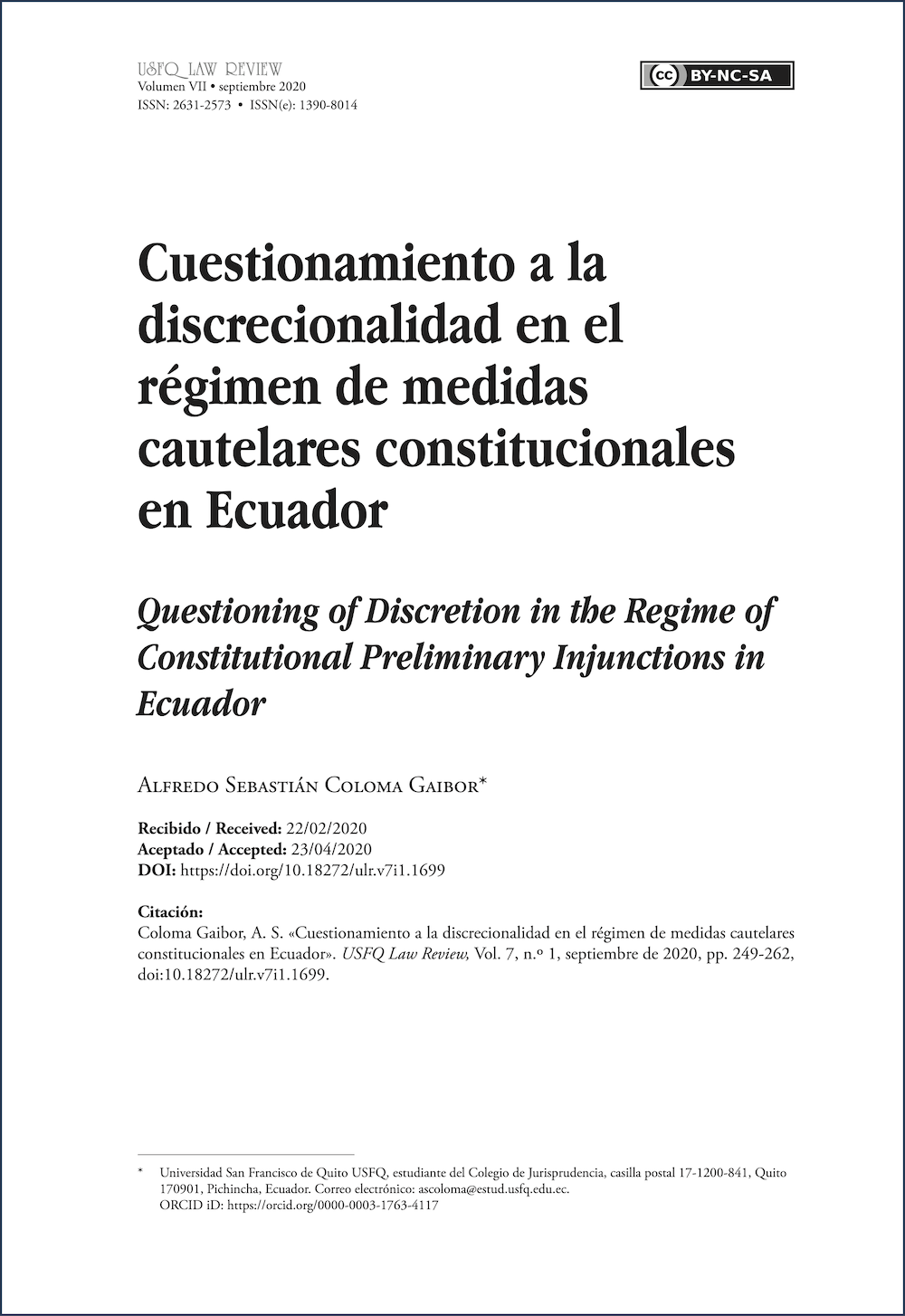Cuestionamiento a la discrecionalidad en el régimen de medidas cautelares constitucionales en Ecuador
DOI:
https://doi.org/10.18272/ulr.v7i1.1699Palabras clave:
Medidas cautelares, derechos fundamentales, prestación de servicios de salud, incumplimiento contractual, abuso del derecho, garantía constitucional, dialisisResumen
Una realidad incómoda, pero abiertamente aceptada, es que los sistemas de justicia latinoamericanos están lejos de ser eficientes. Ecuador no es la excepción. Y no es que no se pueda obtener justicia por parte del Estado, pero la sociedad se ha convencido de que esto puede tardar en llegar. Mecanismos como las medidas cautelares buscan solventar esta dificultad relacionada a la dilación en los procesos, producto del congestionamiento en los servicios jurisdiccionales. En el entorno jurídico la respuesta a un problema puede ser la causa de muchos otros, siendo esto consecuencia de una legislación plagada de antinomias que pueden llevar al sujeto de derechos a la indefensión. Esta es la razón por la cual el presente artículo busca ser una exposición de la normativa pertinente al caso, para así conducir al lector a una discusión fundamentada sobre las implicaciones éticas y legales con respecto de las medidas cautelares.
Primero se brindará un recuento del desarrollo de medidas similares en Ecuador, después buscando aterrizar las debilidades de la normativa expuesta, se utilizará la resolución 2015-10509. Tratándose el caso de un tema relacionado con la salud, específicamente los procedimientos de diálisis, una revisión del régimen jurídico pertinente aclarará cómo se conectan las medidas cautelares con los derechos fundamentales. Subsecuentemente se retomarán los alcances de la normativa que regula esta garantía jurisdiccional y evidenciando el riesgo que comprende la discrecionalidad que desencadena en posibles abusos del derecho, posteriormente se abre paso a la crítica y a la observación de que el régimen jurídico ecuatoriano, en lo que respecta a este capítulo, atenúa su rigor. Recalcando que la delicadeza del tema radica en las facultades de una institución que permite generar prohibiciones o forzar ciertos accionares con incidencia directa sobre los ciudadanos, sin tener un procedimiento de juicio de por medio.
Descargas
Citas
Ávila Santamaría, Ramiro. ¿Cambio de personas para cambiar la justicia? Cultura jurídica, neoconstitucionalismo y transformación social. En Ecuador Debate. Justicia y poder. Quito: Centro Andino de Acción Popular CAAP, 2011.
Barona Betancourt, Ricardo. Los Prestadores de Servicio de Salud. Bogotá: Grupo Editorial Ibañez, 2014.
Código Orgánico General de Procesos. Registro Oficial No. 506 de 22 de mayo de 2016.
Constitución de la República del Ecuador. Registro Oficial No. 449 de 20 de octubre de 2008.
Constitución de la República del Ecuador. Registro Oficial No. 449 de 20 de octubre de 2008.
Corte Constitucional del Ecuador. Sentencia No 001-10-JPO-CC. Sentencia septiembre 2010.
Ley Orgánica de Garantías Jurisdiccionales y Control Constitucional. Registro Oficial No. 52 de 22 de octubre de 2009.
Ley Orgánica del Sistema Nacional de Salud. Artículo 14. Registro Oficial No. 670 de 25 de septiembre de 2002.
Norberto, Bobbio. Teoría General del Derecho. Bogotá: Temis, 1992.
Orgánica de Ley Salud. Capitulo 3. Registro Oficial No. 423 de 22 de diciembre de 2006.
Pacto Internacional de Derechos Económicos, Sociales y Culturales (1966).
Pérez Efraín. Las Medidas Cautelares Constitucionales. En Pérez, José Antonio. Viabilidad de las Garantías Jurisdiccionales. Quito: Corporación de Estudios y Publicaciones, 2012.
Pérez Efraín. Las Medidas Cautelares Constitucionales. En Pérez, José Antonio. Viabilidad de las Garantías Jurisdiccionales. Quito: Corporación de Estudios y Publicaciones, 2012.
Real Academia Española. Diccionario de la lengua española. (22.a ed.). Madrid, España: Autor, 2001.
Rocco, Ugo. Tratado De Derecho Procesal Civil, V Proceso Cautelar. Bogotá: Temis, 1977. En Pérez, José Antonio. Viabilidad de las Garantías Jurisdiccionales. Quito: Corporación de Estudios y Publicaciones, 2012.
Rodríguez Grez. El abuso del derecho y el abuso circunstancial. Santiago: Editorial Jurídica Chile, 1999.
Romero Daniel. La Corte Constitucional resolvió 595 causas en su primer año. El Comercio. 5 de febrero de 2020.
Subsecretaria de Presupuesto. Resumen Ejecutivo Justificativo Proforma Presupuesto General del Estado 2016. Quito: Ministerio de Finanzas, 2016.
Trujillo Julio Cesar. Antecedente histórico. En Pérez, José Antonio. Viabilidad de las Garantías Jurisdiccionales. Quito: Corporación de Estudios y Publicaciones, 2012.
Unidad Civil Cantón Guayaquil. Causa No.2015-10509. Auto Interlocutorio, 7 de octubre de 2015.
Verni,Francisco. "Preocupación ronda en clínicas de diálisis por falta de pagos y medida". El Universo. 19 de octubre de 2015.
Villareal, Roberto.Medidas Cautelares. Quito: Cevallos Editorial Jurídica, 2010.

Publicado
Cómo citar
Número
Sección
Licencia
En relación a los derechos de autor, los autores que publican en USFQ Law Review conocen y aceptan sus políticas internas, en especial pero no exclusivamente:
1. Política de Acceso Abierto.
2. Política de Autoría.
3. Política de Derechos de Autor.
4. Política de Pre-Publicación.
5. Política de Pos-Publicación.
6. Política de Protección de Propiedad Intelectual.
7. Política de Preservación Digital.



